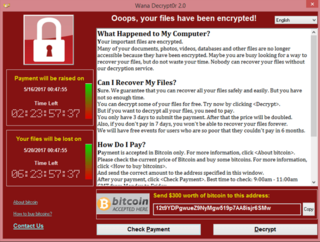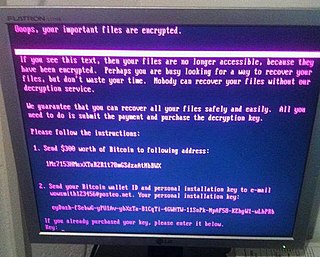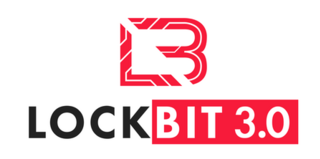Ransomware is a type of malware that permanently blocks access to the victim's personal data unless a "ransom" is paid. While some simple ransomware may lock the system without damaging any files, more advanced malware uses a technique called cryptoviral extortion. It encrypts the victim's files, making them inaccessible, and demands a ransom payment to decrypt them. In a properly implemented cryptoviral extortion attack, recovering the files without the decryption key is an intractable problem, and difficult-to-trace digital currencies such as paysafecard or Bitcoin and other cryptocurrencies are used for the ransoms, making tracing and prosecuting the perpetrators difficult.

The Colonial Pipeline is the largest pipeline system for refined oil products in the U.S. The pipeline – consisting of three tubes – is 5,500 miles (8,850 km) long and can carry 3 million barrels of fuel per day between Texas and New York.
A blended threat is a software exploit that involves a combination of attacks against different vulnerabilities. Blended threats can be any software that exploits techniques to attack and propagate threats, for example worms, trojan horses, and computer viruses.

The Internet has a long history of turbulent relations, major maliciously designed disruptions, and other conflicts. This is a list of known and documented Internet, Usenet, virtual community and World Wide Web related conflicts, and of conflicts that touch on both offline and online worlds with possibly wider reaching implications.

Bitdefender is a multinational cybersecurity technology company dual-headquartered in Bucharest, Romania and Santa Clara, California, with offices in the United States, Europe, Australia and the Middle East.
Mandiant, Inc. is an American cybersecurity firm and a subsidiary of Google. Mandiant received attention in February 2013 when it released a report directly implicating China in cyber espionage. In December 2013, Mandiant was acquired by FireEye for $1 billion, who eventually sold the FireEye product line, name, and its employees to Symphony Technology Group for $1.2 billion in June 2021.
Monero is a cryptocurrency which uses a blockchain with privacy-enhancing technologies to obfuscate transactions to achieve anonymity and fungibility. Observers cannot decipher addresses trading Monero, transaction amounts, address balances, or transaction histories.

The WannaCry ransomware attack was a worldwide cyberattack in May 2017 by the WannaCry ransomware cryptoworm, which targeted computers running the Microsoft Windows operating system by encrypting data and demanding ransom payments in the Bitcoin cryptocurrency. It was propagated using EternalBlue, an exploit developed by the United States National Security Agency (NSA) for Windows systems. EternalBlue was stolen and leaked by a group called The Shadow Brokers a month prior to the attack. While Microsoft had released patches previously to close the exploit, much of WannaCry's spread was from organizations that had not applied these, or were using older Windows systems that were past their end of life. These patches were imperative to cyber security, but many organizations did not apply them, citing a need for 24/7 operation, the risk of formerly working applications breaking because of the changes, lack of personnel or time to install them, or other reasons.

Petya is a family of encrypting malware that was first discovered in 2016. The malware targets Microsoft Windows–based systems, infecting the master boot record to execute a payload that encrypts a hard drive's file system table and prevents Windows from booting. It subsequently demands that the users make a payment in Bitcoin in order to regain access to the system.

A series of powerful cyberattacks using the Petya malware began on 27 June 2017 that swamped websites of Ukrainian organizations, including banks, ministries, newspapers and electricity firms. Similar infections were reported in France, Germany, Italy, Poland, Russia, United Kingdom, the United States and Australia. ESET estimated on 28 June 2017 that 80% of all infections were in Ukraine, with Germany second hardest hit with about 9%. On 28 June 2017, the Ukrainian government stated that the attack was halted. On 30 June 2017, the Associated Press reported experts agreed that Petya was masquerading as ransomware, while it was actually designed to cause maximum damage, with Ukraine being the main target.
REvil was a Russia-based or Russian-speaking private ransomware-as-a-service (RaaS) operation. After an attack, REvil would threaten to publish the information on their page Happy Blog unless the ransom was received. In a high profile case, REvil attacked a supplier of the tech giant Apple and stole confidential schematics of their upcoming products. In January 2022, the Russian Federal Security Service said they had dismantled REvil and charged several of its members.
Ryuk is a type of ransomware known for targeting large, public-entity Microsoft Windows cybersystems. It typically encrypts data on an infected system, rendering the data inaccessible until a ransom is paid in untraceable bitcoin. Ryuk is believed to be used by two or more criminal groups, most likely Russian or Ukrainian, who target organizations rather than individual consumers.
DarkSide is a cybercriminal hacking group, believed to be based in Russia, that targets victims using ransomware and extortion; it is believed to be behind the Colonial Pipeline cyberattack. The group provides ransomware as a service.

On 14 May 2021, the Health Service Executive (HSE) of Ireland suffered a major ransomware cyberattack which caused all of its IT systems nationwide to be shut down.
In mid-May 2021 hospital computer systems and phone lines run by the Waikato District Health Board (DHB) in New Zealand were affected by a ransomware attack. On 25 May, an unidentified group claimed responsibility for the hack and issued an ultimatum to the Waikato DHB, having obtained sensitive data about patients, staff and finances. The Waikato DHB and New Zealand Government ruled out paying the ransom.
On May 30, 2021, JBS S.A., a Brazil-based meat processing company, suffered a cyberattack, disabling its beef and pork slaughterhouses. The attack impacted facilities in the United States, Canada, and Australia.
On 2 July 2021, a number of managed service providers (MSPs) and their customers became victims of a ransomware attack perpetrated by the REvil group, causing widespread downtime for over 1,000 companies. The attack was carried out by exploiting a vulnerability in VSA, a remote monitoring and management software package developed by Kaseya. Two suspects were identified and one sentenced.
Hive was a ransomware as a service (RaaS) operation carried out by the eponymous cybercrime organization between June 2021 and January 2023. The group's purpose was to attack mainly public institutions to subsequently demand ransom for release of hijacked data.

LockBit is a cybercriminal group proposing ransomware as a service (RaaS). Software developed by the group enables malicious actors who are willing to pay for using it to carry out attacks in two tactics where they not only encrypt the victim's data and demand payment of a ransom, but also threaten to leak it publicly if their demands are not met.










